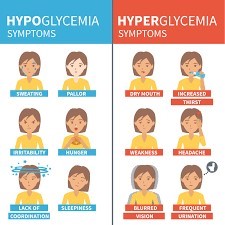A nurse is providing teaching to a client who has a new diagnosis of type 1 diabetes mellitus. The nurse should instruct the client to monitor for which of the following findings as a manifestation of hypoglycemia?
Irritability
Increased urination
Vomiting
Facial flushing
The Correct Answer is A
Irritability.

The rationale for each choice is as follows:
- A. Irritability: Correct. Irritability is one of the signs of hypoglycemia, which occurs when blood glucose levels fall below 70 mg/dL (3.9 mmol/L). Other signs include shakiness, sweating, hunger, headache, confusion, and blurred vision.
- B. Increased urination: Incorrect. Increased urination is one of the signs of hyperglycemia, which occurs when blood glucose levels rise above 180 mg/dL (10 mmol/L). Other signs include thirst, dry mouth, fatigue, nausea, and fruity breath odor.
- C. Vomiting: Incorrect. Vomiting is not a specific sign of hypoglycemia or hyperglycemia, but it can occur as a complication of either condition if left untreated or poorly managed.
- D.Facial flushing: Incorrect. Facial flushing is not a sign of hypoglycemia or hyperglycemia, but it can occur as a side effect of some medications used to treat diabetes, such as niacin or rosiglitazone.
Nursing Test Bank
Naxlex Comprehensive Predictor Exams
Related Questions
Correct Answer is D
Explanation
- A. Discussing the suspicion of physical abuse with the provider is the appropriate action for the nurse to take. However, this should be done after the matter is reported to child protection services.
- B. Confronting the parents with the suspicion of physical abuse is not an appropriate action for the nurse to take, as it can escalate the situation and endanger the child or the nurse.
- C. Asking the hospital security to detain and question the parents is not an appropriate action for the nurse to take, as it violates the parents' rights and may interfere with the legal process.
- D.Contacting Child Protective Services is appropriate action for the nurse to take at this point as it is the nurse's legal responsibility to do so.
Correct Answer is D
Explanation
Move the client to a room near the nurses' station.
- A. Keep the client's television on with the volume low: This is incorrect because it does not address the client's safety or agitation. The television might also be a source of confusion or stimulation for the client.
- B. Insert an indwelling urinary catheter to minimize interaction with the client: This is incorrect because it is an invasive and unnecessary procedure that increases the risk of infection and trauma. It also violates the client's dignity and autonomy.
- C. Consult the provider regarding administering a mild sedative on a schedule: This is incorrect because it is not the first action to take. The nurse should first assess the client's condition and identify possible causes of disorientation and combativeness, such as pain, infection, medication side effects, or delirium. Sedatives should be used as a last resort and only with informed consent.
- D. Move the client to a room near the nurses' station: This is correct because it allows for close observation and supervision of the client, which can prevent injury and promote safety. It also facilitates frequent interaction and reassurance from the staff, which can reduce anxiety and agitation.
Whether you are a student looking to ace your exams or a practicing nurse seeking to enhance your expertise , our nursing education contents will empower you with the confidence and competence to make a difference in the lives of patients and become a respected leader in the healthcare field.
Visit Naxlex, invest in your future and unlock endless possibilities with our unparalleled nursing education contents today
Report Wrong Answer on the Current Question
Do you disagree with the answer? If yes, what is your expected answer? Explain.
Kindly be descriptive with the issue you are facing.
